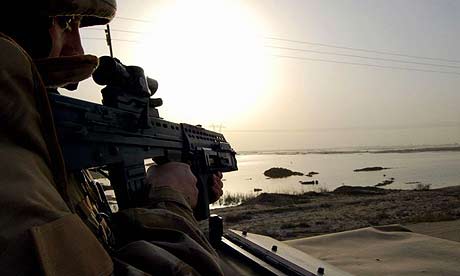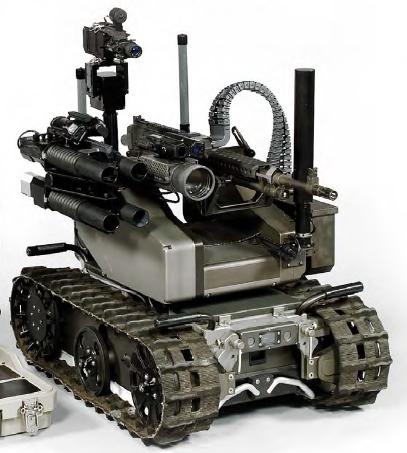
A British soldier patrols the northern suburbs of Basra. Photograph: Dave Clark/AFP/Getty images
The Telegraph
reports that Lieutenant-General Louis Lillywhite, the Surgeon General, has said
Double the number of troops are now surviving serious injuries than would have done during the Falklands conflict. But while they receive high-quality emergency care while still on the frontline, the focus now needs to shift to improving follow-up treatment in British hospitals.
The article continues
Those who are capable of surviving, we are making survive. Three or four months ago that was our main effort. We have now got to turn to the quality of that survival. Adding it was impossible for all injured servicemen to be dealt with in military facilities because of a lack of manpower. There is much to do he admitted.
Apparently the Royal Army Medical Corps (RAMC) now routinely logs every detail of injuries in theatre, from the type of injury and its severity, the length of time the casualty remained in a battlefield and, if deaths occur, whether it was possible to prevent them, given the safety of the scene and the injuries.
The figures show that by mid-February, the Armed Forces had suffered in Afghanistan,
- 87 fatalities
- 114 personnel were seriously or very seriously injured
- 1,133 injured personnel were admitted to field hospitals
- 880 were evacuated to the UK.
In Iraq,
- 212 had died by mid-February
- 212 were seriously or very seriously injured
- 2,695 were admitted to field hospitals
- 1,347 were evacuated to the UK.
These figures are probably the first to be released to the public showing the casualty rates in these two theatres for UK forces.
A journal published by the RAMC reported that of the 76 deaths from trauma related injuries which occurred in Iraq and Afghanistan in the 12 months to April 2007, none could have been prevented.
Statistical evidence from Britain and the US suggested that the death rate from serious injuries was now between 12 to 15 per cent - roughly half the rate which occurred in the Falklands or Vietnam.
Most seriously injured service personnel brought back to the UK are treated in civilian hospitals at first, although many will later be transferred to the military rehabilitation centre at Headley Court in Surrey.
There has been repeated criticism of the standard of care servicemen - most of whom have suffered head injuries, severe burns or lost limbs - receive in the civilian system. At Selly Oak in Birmingham, troops have complained of dirty, mixed wards and of abusive treatment from staff.
Last month, Afghanistan veteran and paratrooper Capt Martin Hewitt said the "truth'' about the continued poor care for troops back in the UK had to be exposed as it was "unacceptable''.
Not only is standard of care unacceptable but the compensation paid to injured troops is also woeful. Take a look at
this story on
Rogue Gunner's blog, which highlights
the case of
A hero British soldier left severely crippled by an Iraqi sniper has been awarded a paltry £35,000 in compensation from the Army.
Jon Le Galloudec, 27, was picked off on the streets of Basra almost a year ago. His brave comrade Rodney Wilson came to his aid and was shot dead in front of him. The bullet that hit Jon ripped through his spine leaving him paralysed in his left leg and from the knee down in his right leg.
Contrast this with
the record £2million compensation to an Iraqi teenager paralysed by a stray British bullet or the £484,000
awarded to an RAF typist who injured her thumb.
Currently the NHS and this government do not do enough for out injured personnel. They are now relying on public donations and help to get vital rehabilitation facilities. Have a look at the very worthwhile "Help for Heroes" organisation's website which has now raised over £6m for facilities in just over 8 months or donate via the sidebar link.Injured troops must get better NHS treatment - Telegraph









